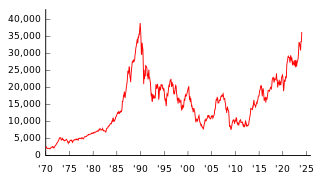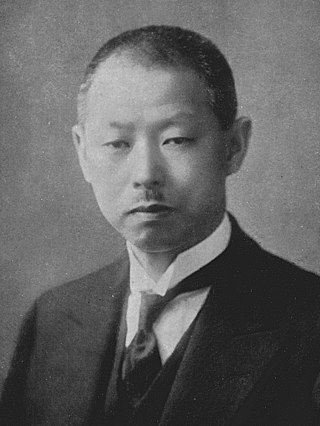
Nissan Motor Corporation is a Japanese multinational automobile manufacturer headquartered in Yokohama, Kanagawa, Japan. The company sells its vehicles under the Nissan and Infiniti brands, and formerly the Datsun brand, with in-house performance tuning products under the Nismo and Autech brands. The company traces back to the beginnings of the 20th century, with the Nissan zaibatsu or called Nissan Group.

The Nikkei 225, or the Nikkei Stock Average, more commonly called the Nikkei or the Nikkei index, is a stock market index for the Tokyo Stock Exchange (TSE). It is a price-weighted index, operating in the Japanese Yen (JP¥), and its components are reviewed twice a year. The Nikkei 225 measures the performance of 225 highly capitalised and liquid publicly owned companies in Japan from a wide array of industry sectors. Since 2017, the index is calculated every five seconds. It was originally launched by the Tokyo Stock Exchange in 1950, and was taken over by the Nihon Keizai Shimbun newspaper in 1970, when the Tokyo Exchange switched to the Tokyo Stock Price Index (TOPIX), which is weighed by market capitalisation rather than stock prices.

The Mitsubishi Group is a group of autonomous Japanese multinational companies in a variety of industries.

Zaibatsu is a Japanese term referring to industrial and financial vertically integrated business conglomerates in the Empire of Japan, whose influence and size allowed control over significant parts of the Japanese economy from the Meiji period to World War II. A zaibatsu's general structure included a family-owned holding company on top, and a bank which financed the other, mostly industrial subsidiaries within them. Although the zaibatsu played an important role in the Japanese economy beginning in 1868, they especially increased in number and importance following the Russo-Japanese War, World War I, and Japan's subsequent attempt to conquer East Asia and the Pacific Rim during the interwar period and World War II. After World War II, they were dissolved by the Allied occupation forces and succeeded by the keiretsu. Equivalents to the zaibatsu can still be found in other countries, such as the chaebol conglomerates of South Korea.

Mitsui Group is a Japanese corporate group and keiretsu that traces its roots to the zaibatsu groups that were dissolved after World War II. Unlike the zaibatsu of the pre-war period, there is no controlling company with regulatory power. Instead, the companies in the group hold shares in each other, but they are limited to exchanging information and coordinating plans through regular meetings.

Yoshisuke Aikawa was a Japanese entrepreneur, businessman, and politician, noteworthy as the founder and first president of the Nissan zaibatsu (1931–1945), one of Japan's most powerful business conglomerates around the time of the Second World War.

Eneos Corporation, formerly JXTG Nippon Oil & Energy Corporation, or NOC or Shin-Nisseki (新日石) is a Japanese petroleum company. Its businesses include exploration, importation, and refining of crude oil; the manufacture and sale of petroleum products, including fuels and lubricants; and other energy-related activities. It is the largest oil company in Japan, and in recent years it has been expanding its operations in other countries.

Sompo Holdings, Inc., formerly NKSJ Holdings and Sompo Japan, is a Japanese insurance company. It is the second-largest property insurance company in Japan only behind Tokio Marine, with market share of 19.3% in 2007.
Tohatsu Corporation, previously Tokyo Hatsudoki Company, is a Japanese company manufacturing and selling outboard motors, pleasure boats, portable fire pumps, small fire trucks, pumps for construction and drainage, and refrigeration units for transportation. It also does real estate property management in Japan.
Fuyo Group is a Japanese keiretsu descended from the Yasuda zaibatsu, Asano zaibatsu and Okura zaibatsu. They were a major business grouping in Japan up to World War II. In 1948, Yasuda was dismantled, with its key financial arm Yasuda Bank becoming Fuji Bank.
Japan Energy Corporation was a Japanese petroleum company, a wholly owned subsidiary of Nippon Mining Holdings. The petroleum products of Japan Energy Corporation were sold by filling stations under the brand name JOMO.

Fusanosuke Kuhara was an entrepreneur, politician and cabinet minister in the pre-war Empire of Japan.

The Manchurian Industrial Development Company was an industrial conglomerate, or zaibatsu, in the Japanese-controlled Empire of Manchuria (Manchukuo), established at the instigation of the Imperial Japanese Army to further the industrialization of Manchukuo, and in particular, to make it self-sufficient in strategic heavy industries.

Hitachi Zosen Corporation is a major Japanese industrial and engineering corporation. It produces waste treatment plants, industrial plants, precision machinery, industrial machinery, steel mill process equipment, steel structures, construction machinery, tunnel boring machines, and power plants. Despite its name, Hitachi Zosen, of which the last word literally means shipbuilding, no longer builds ships, having spun off the business to Universal Shipbuilding Corporation in 2002, nor is it a keiretsu company of Hitachi any longer.

Furukawa Group formerly Furukawa zaibatsu (古河財閥) is one of Japan's 15 largest industrial groups. Its origins date back to 1875, founder Furukawa Ichibei. This group specialized in mining, electronics, and chemicals industry before World War II.

ENEOS Holdings, Inc. (ENEOSホールディングス株式会社) is a Japanese global petroleum and metals conglomerate headquartered in Tokyo, Japan. In 2012 the multinational corporation consisted of 24,691 employees worldwide and, as of March 2013, JX Holdings was the forty-third largest company in the world by revenue. It is one of the core companies of the Mitsubishi Group through its predecessor 's merger with Mitsubishi Oil.

The Innovation Network Corporation of Japan (INCJ), headquartered in Tokyo, is a public-private partnership between the Japanese government and 19 major corporations.
Tokyu Kurogane Industries, or Kurogane, was one of the first Japanese automakers. It built vehicles from about 1926 until 1962 when a subsidiary of Nissan, called Nissan Machinery, assumed operations as the company had become a member of the Nissan Group keiretsu. The word kurogane is an old term for iron, and one of the kanji used in Mr. Makita's first name. Remnants of the company were called Nissan Machinery until 1985, and operated as a separate entity within Nissan Techno until 2006, building and developing all of Nissan's current engines.
NMKV Co., Ltd. is a joint venture company between Nissan Motor Co., Ltd. and Mitsubishi Motors in the Japanese market to design, develop, and manufacture kei cars under Nissan and Mitsubishi brands. The company currently produces Mitsubishi eK, Nissan Dayz, Mitsubishi eK Space and Nissan Roox for the domestic market. NMKV stands for Nissan Mitsubishi Kei Vehicle. Despite that, the abbreviation was never announced officially by the company.

Michinori Holdings, Inc. is a holding company headquartered in Chiyoda, Tokyo, and a wholly owned subsidiary of Industrial Growth Platform, Inc. Michinori Holdings rehabilitates deficit companies which have so much liability that they cannot act as an administrator of assets. It manages them by acquiring and holding their shares until they return to financial stability and viability.














